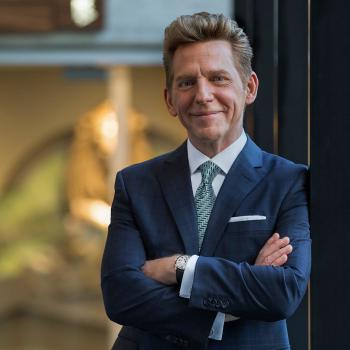In today’s LA Times, a Scientologist answers questions about Scientology beliefs and what media and critics claim Scientologists believe.
Name three of the most basic beliefs in Scientology. What do members have to believe in, in order to be Scientologists?
There is no belief, per se, in Scientology, because folks are asked to come to experience and therefore know things, but not to believe them until they have observed them. However, some basic principles are:
You are a spirit (we use the word “thetan” to refer to your spiritual self), who has a mind and a body. You are eternal. This is not your first corporeal life, and is unlikely to be your last. You are basically good. When you behave badly, it is due to having the wrong answers about how to solve your problems, and/or because you have strayed from healthy and constructive purposes. Having done bad, one tends to limit and punish oneself in ways that can do lasting damage. Some of Scientology’s techniques are aimed at unraveling self-inflicted damage.
What is ARC?
Understanding can actually be broken down into elements of Affinity (liking or willingness to be near), Reality (sameness, accuracy or agreement with a referent) and Communication (the exchange of unaltered information). The increase of these factors increases understanding, life, “love,” vitality, success, camaraderie, emotional state, etc. The decrease of these factors decreases the foregoing. The decrease of one of these elements with regard to a particular person, activity, thing or subject, will reduce the other two elements. So you hear Scientologists talk about ARC — and when they do so, they are referencing understanding, friendship, cooperativeness, etc. It’s a little like “Shalom” or “Aloha” as a word. It multitasks.
What are three of the most commonly held mistaken beliefs about Scientology?
1) The belief that Scientology or Scientologists are odd, secretive, “different” in some way, or that their exposure to Scientology causes them to view the world through a filter, etc. We’re regular folks.
2) That we have something against medicine or doctors. We are some medicine-takin’, doctor-goin’ fools, with respect to anything that might be a physical ailment, and for which there is some known/approved medical treatment/remedy. Yeah, some of us think herbs, vitamins, chiropractors are a good first line of defense, but when a dog rips a hole in my hand, you will find me in the ER getting stitched up, and then at the pharmacy filling my scrip. Further, I may seek an “assist” from a Scientologist friend to help me not be bogged down by trauma or “phantom” pains from the bite. Or, I might just see the doc and get the antibiotics and leave it at that.
3) I gotta say, I recently read an article which named Tom Cruise as the “No. 2 or 3 ranking” Scientologist. What? He’s not even a Scientology staffer or anything like that. How’s he gonna have a “rank?” He’s a private Scientologist like me — except I’ve BEEN on staff, and he never has, to my knowledge. This is all tied up in this weird idea that Scientology or Scientologists or the Church of Scientology somehow have some say in what high-profile Scientologists do with their lives, how they behave, what kinds of things they say, who they hang out with, what projects they pursue, etc. Hogwash.
Critics of Scientology bring up unusual topics such as Xenu and thetans and aliens …
You are a thetan. I am a thetan. Think of it as “soul” or “spirit” or “identity.” We have our minds and our bodies, but we are not these things. We don’t have mass or motion or wavelength or a position in time or space. We can perceive, and we can imagine/decide/postulate things. As such, it’s not useful to try to think of the real “you,” in measurable material terms. There is a general view among Scientologists that people’s personal histories predate the very existence of the material universe as such, and that had we not been here already, matter, energy, space and time would not be here. That view naturally subsumes the idea of ancient and future civilizations rising and falling over time, and the potential of intelligent life in more than one place in the universe. We do not otherwise take “aliens,” etc. into account in our daily thinking or Scientology practice. The vast, vast majority of Scientologists have never even heard of such things, except in the context of “how did we arrive at the state of affairs of human society today?”
Ron put forth some early theories as to how intelligent life might have happened to arise on this particular planet, and these theories [take] into account the possibility that you and I existed for a very long time before Earth was habitable and that the presence of water, carbon compounds, and the resulting evolution of life here provided an opportunity for you and I to be alive here rather than somewhere else.
The idea of the existence of timeless, deathless spiritual beings necessarily assumes that we exist independent of the state of affairs on this speck of rock at the edge of the Milky Way. It also implies that it would be rather conceited of man to think himself the only intelligent life in the universe. We think of ourselves (many Scientologists do — if they have experience, recollection or perception they see as supporting the view) as spiritual beings who preexisted this planet, and we may not be alone in the universe. Scary, no?








